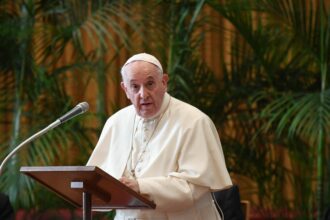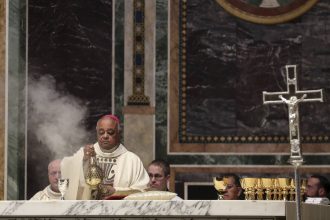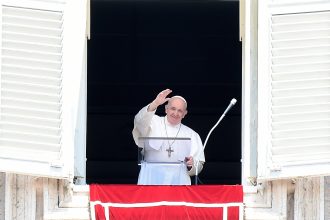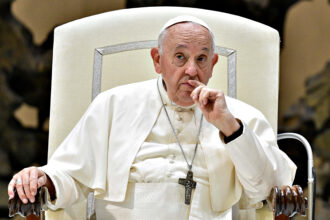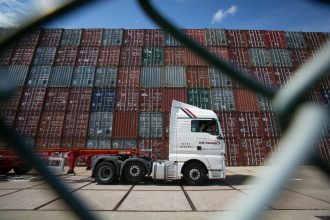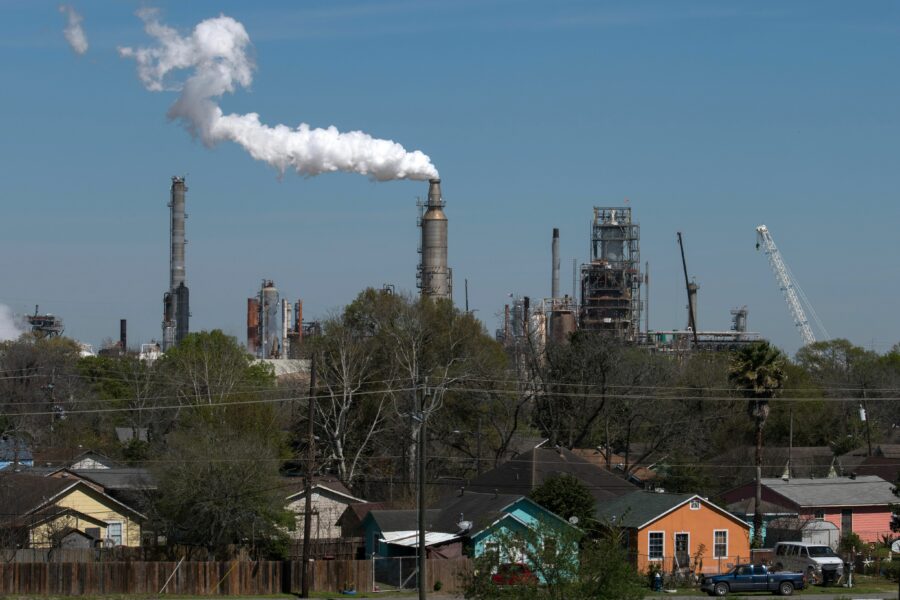Taking aim at the United States and an “irresponsible lifestyle” with some of the world’s highest carbon emissions per capita, Pope Francis on Wednesday doubled down on his earlier call for urgent action to tackle climate change, while also criticizing a failing global response to the crisis.
Eight years after the Vatican published Francis’ landmark “Laudato Si’: On Care for our Common Home,” the first papal teaching letter sent to all of the church’s bishops focused on the environment, the pontiff’s new writing comes in the form of a papal exhortation called Laudate Deum, or Praise God.
On the climate crisis, Francis writes that “our responses have not been adequate, while the world in which we live is collapsing and may be nearing the breaking point.”
The Vatican published Laudate Deum in advance of the 28th United Nations Climate Change Conference to be held Nov. 30 to Dec. 12 in the oil-rich United Arab Emirates, which has invested heavily in increasing hydrocarbon production capacity, according to the U.S. Energy Information Agency.
In the document, Pope Francis challenged U.N. negotiators to strengthen the agreement they reached in Paris in 2015, to include “binding forms of energy transition that meet three conditions: that they be efficient, obligatory and readily monitored.”
He warned that technology alone won’t solve a climate crisis that’s only getting worse. He specifically mentioned “technological advances that make it possible to absorb or capture (heat-trapping) gas emissions,” writing that they have “proved promising.”
But he added: “We risk remaining trapped in the mindset of pasting and papering over cracks,” and that “to suppose that all problems in the future will be able to be solved by new technical interventions is a form of homicidal pragmatism, like pushing a snowball down a hill.”
People, he writes, “have turned into highly dangerous beings, capable of threatening the lives of many beings and our own survival. We need lucidity and honesty in order to recognize in time that our power and the progress we are producing are turning against us.”
Other popes have commented on the need to care for the environment, but Francis has stood out as a global leader and moral force, taking to task fossil fuel companies and rich countries alike, while speaking against economic greed that underlies the climate crisis. His new writings are primarily aimed at the world’s 1.3 billion Catholics, following earlier calls for them to take into account human-driven global warming that puts so many of the poorest people on the planet at the greatest risk. But his words also resonate more widely with people who share his concerns.
Strong Reactions
Climate scientist and evangelical Christian Katherine Hayhoe, author of the book “Saving Us: A Climate Scientist’s Case for Hope and Healing in a Divided World,” said Francis’ clarity and bluntness in his latest document stood out to her.
“He does not shy away from calling out the power structures and the anthropocentric and technocratic mindsets that are the root causes of the situation we find ourselves in today,” Hayhoe said. “He fully acknowledges the ‘but what about…?’ arguments people will immediately throw up in response to his words, and addresses them right there in the document.
If those who hold the balance of power and wealth in this world were willing to heed his words, a better future could truly be within reach. I pray that they do.”
The Rev. Leah D. Schade, associate professor of preaching and worship at the Lexington Theological Seminary in Kentucky, said the pope has spoken “the painful, unavoidable truth of the catastrophe we have created. He does not mince words and speaks to the frustration and anger many of us in the faith and climate movement have experienced as our words and warnings have fallen on deaf ears.”
Pope Francis’ new message makes a strong theological claim and anthropological critique, said Schade, author of the book, Creation-Crisis Preaching: Ecology, Theology, and the Pulpit. It supports a viewpoint that “until we recognize our proper place in creation, as members of the web of life with special responsibility to ensure its survival and flourishing, we will continue on this path to destruction,” she said. “Those with the power to make change need to do it and do it now.”
Alberto Pallecchi, acting director of the World Resources Institute’s Faith and Sustainability Initiative, said the Vatican’s publication of the document before the climate conference “may be the signal needed for countries to transform economies and improves people’s lives and livelihoods, with climate justice at the center.”
The document “reads like a last call for the world to act on climate and protect our common home, not just as an environmental issue but a global social issue deeply intertwined with the dignity of human life,” he said.
Author and environmental activist Bill McKibben, speaking during a webinar on Wednesday hosted by the Laudito Si’ Movement, a coalition of Catholic organizations working on climate matters, said the pope’s words speak to the need to reach people’s hearts.
“Yes, the engineers have done their job,” McKibben said. “Yes, the scientists have done their job. But it’s high time for the human heart to do its job. And that’s what we need this leadership for so, so badly.”
In the United States, the pope’s message has faced what some researchers have identified as a bottleneck—recalcitrance by U.S. Catholic bishops to fully embrace his teachings on climate change, specifically the 2015 encyclical. Researchers at Creighton University found in 2021 that bishops in the United States had been nearly silent and sometimes even misleading on Laudato Si’.
In the new document, the pope gave U.S. bishops credit for having in 2019 “expressed very well this social meaning of our concern about climate change, which goes beyond a merely ecological approach, because ‘our care for one another and our care for the earth are intimately bound together.’”
But he also called out Americans for having an oversized influence on the climate.
“If we consider that emissions per individual in the United States are about two times greater than those of individuals living in China, and about seven times greater than the average of the poorest countries, we can state that a broad change in the irresponsible lifestyle connected with the Western model would have a significant long-term impact,” he writes. “As a result, along with indispensable political decisions, we would be making progress along the way to genuine care for one another.”
The U.S. Council of Catholic Bishops did not immediately respond to requests for comment.
A report by Pew Research Center published last week found that “Catholics are no more likely than Americans overall to view climate change as a serious problem. Despite Francis’ years of outspokenness on the subject, not all Catholics in the United States share his concerns” about climate change, with a clear partisan dividing line, the Pew center said.
Some 82 percent of Catholics who are Democrats or lean toward the Democratic Party say global climate change is an extremely or very serious problem, while just 25 percent of Republican and Republican-leaning Catholics agree, according to Pew.
A Nod to Rights of Nature Movement
Laudate Deum also affirmed principles championed by the so-called “rights of nature” movement that recognizes nature and all its constituent parts—forests, rivers, wildlife and soil among other elements—possess inherent rights to life and regeneration.
“For ‘we are part of nature, included in it and thus in constant interaction with it,'” the pope writes, echoing Laudato Si’ as well as his speech before the United Nations General Assembly that same year. In that speech, the pontiff explained: “First, it must be stated that a true ‘right of the environment’ does exist.
Advocates behind the rights of nature movement promote the idea that humans are part of nature, not separate from the rest of the Earth. On Wednesday, the Pope expressed similar sentiments.
“Human beings must be recognized as a part of nature,” Francis writes in Laudate Deum. “Human life, intelligence and freedom are elements of the nature that enriches our planet, part of its internal workings and its equilibrium.”
The writing goes on to highlight that Indigenous cultures have, over centuries, interacted with their environment “without destroying or endangering it.”
Those Who Deny Climate Science
In the new document, the pope recaps the latest climate science dealing with everything from sea level rise to extreme weather and writes that more intense “great rains and floods,” extreme heat waves and droughts “have left many people adrift.”
He laments those who deny climate science and writes that they were wrong to ridicule those who accept the science.
“In recent years, some have chosen to deride these facts,” the pope writes. “They bring up allegedly solid scientific data, like the fact that the planet has always had, and will have, periods of cooling and warming. They forget to mention another relevant datum: that what we are presently experiencing is an unusual acceleration of warming, at such a speed that it will take only one generation—not centuries or millennia—in order to verify it. The rise in the sea level and the melting of glaciers can be easily perceived by an individual in his or her lifetime, and probably in a few years many populations will have to move their homes because of these facts.”
He writes that “certain apocalyptic diagnoses may well appear scarcely reasonable or insufficiently grounded,” but warned that “this should not lead us to ignore the real possibility that we are approaching a critical point. Small changes can cause greater ones, unforeseen and perhaps already irreversible, due to factors of inertia. This would end up precipitating a cascade of events having a snowball effect. In such cases, it is always too late, since no intervention will be able to halt a process once begun.”
A Stronger Global Climate Agreement
The pope’s concerns are backed by science, and he got the science right in Laudate Deum, said Johan Rockström, director of the Potsdam Institute for Climate Impact Research and professor in earth system science at the University of Potsdam in Germany.
The Earth is facing several key climate tipping points as it approaches a temperature increase of 1.5 degrees Celsius, Rockström said during the Laudato Si’ Movement webinar. “We have had the warmest temperature this year over the past 100,000 years,” he added.
Still, Rockström said he sees the beginning of the end of the fossil fuel economy. “The handwriting is on the wall. There is no turning back and that is why we are getting hard reactions from those who have a vested interest in the status quo.”
After the COP27 climate conference in Egypt last year, Inside Climate News reported that some scientists in attendance saw it as the moment when the world gave up on limiting global warming to 1.5 degrees Celsius, the most ambitious goal set by the 2015 Paris Agreement.
Keep Environmental Journalism Alive
ICN provides award-winning climate coverage free of charge and advertising. We rely on donations from readers like you to keep going.
Donate NowThe only way to stay under that limit, a United Nations Environment Programme report concluded, would be for industrialized nations to rapidly reduce greenhouse gas emissions—cutting them by about half in the next eight years and to zero by 2050. But delegates to the climate conference in Egypt haven’t committed to that.
A U.N. report released just before COP27 found that the pledges to reduce greenhouse gas emissions up until then put the planet on a path to heat between 2.1 and 2.9 degrees. That would be enough to produce catastrophic climate impacts, including more deadly heatwaves, worsening droughts and water shortages and crop failures, as well degradation of ecosystems that could wipe out some species of mammals, insects, birds and plants.
In Laudate Deum, the pope writes that the Paris agreement has been poorly implemented due to a lack of mechanisms to ensure oversight and enforcement.
He reiterated what he had written in 2015: that “international negotiations cannot make significant progress due to positions taken by countries which place their national interests above the global common good.
“Those who will have to suffer the consequences of what we are trying to hide,” he writes, “will not forget this failure of conscience and responsibility.”
Inside Climate News reporter Katie Surma contributed to this report.







